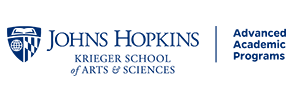Johns Hopkins University Online MS in Regulatory Science
Johns Hopkins University (JHU) Advanced Academic Programs (AAP), based in Baltimore, Maryland, offers an online master of science (MS) in regulatory science focused on clinical drug and biologics development, testing management, laws concerning food and drugs, issues of intellectual property and licensing, and compliance with federal and state regulations. It provides a strong science foundation, a high level of interactivity, and an abundant selection of electives.
JHU is known for excellence, innovation, research, and hands-on learning opportunities throughout its programs, and perhaps particularly in healthcare and the biosciences. Given its proximity to government regulatory agencies such as the Food and Drug Administration (FDA), JHU is uniquely positioned to help prepare the regulatory science and bioscience product development leaders that industry needs.
Students in the MS in regulatory science program learn through empirical experiences such as case study assignments and a final practicum course. During the practicum, students apply their knowledge and learned skills from the previous courses throughout the program to actual cases from the Food and Drug Administration (FDA). Students take on the roles of a regulatory science professional or consumer advocacy group to conduct research, evaluate the case in light of the research, and present their findings as a legally justifiable position depending on the role they chose. Students then debate the issue with fellow classmates according to their chosen roles, and must be able to legally justify their positions from different vantage points.
Professionals with a bachelor’s degree in life sciences or engineering may apply.
| Johns Hopkins University Regulatory Programs | ||
|---|---|---|
| Program | Degree Type | Learn More |
| MS Regulatory Science | Master's Degree | Visit Site |
For the 2023-2024 academic year, we have 112 schools in our MHAOnline.com database and those that advertise with us are labeled “sponsor”. When you click on a sponsoring school or program, or fill out a form to request information from a sponsoring school, we may earn a commission. View our advertising disclosure for more details.
What to Expect from the JHU Online MS in Regulatory Science
Admission Requirements: Applicants to the JHU online MS in regulatory science must hold a bachelor’s degree in life sciences or engineering from a regionally accredited U.S. institution, with a GPA of 3.0 or higher. In addition, there are prerequisite courses as listed under the curriculum section below. Students to either program must submit an online application, application fee, a 500-word essay, a current resume or CV, and unofficial copies of all transcripts. Students must also mail official copies of transcripts via postal mail. No GRE is required for admission, but it may be requested by admissions. There is no work experience requirement. The 500-word essay should focus on why the applicant seeks to join either program, covering one’s long-term goals and academic and professional strengths.
International Students: Upload an unofficial copy of the course-by-course transcript evaluation with GPA interpreted through a service such as the World Education Service or Educational Perspectives. An official transcript from the school is also required. Acceptable TOEFL, IELTS, or PTE test scores are also required.
Study Plan: Students may begin courses in the fall, spring, or summer. Applications are accepted on a rolling basis. Students have up to five years to complete either program, but students can complete the programs in as little as one year. Most working professionals take two to three years to complete either program. Coursework for the MS in regulatory science is highly interactive and taught by professionals from the biotechnology industry and the FDA.
Curriculum: Both programs consist of 40 credits taken through ten courses of four credits each. Seven of these are required, and three courses are electives. Students with relevant coursework or extensive experience may request a core course waiver, and if granted, can substitute another elective.
Regulatory Science Prerequisites: One semester of biochemistry and one semester of cell biology at the undergraduate or graduate level; or foundations of bioscience, which is offered to students with provisional admission.
Regulatory Science Required Courses: Introduction to regulatory affairs; clinical development of drugs and biologics; biological processes in regulatory affairs; introduction to cGMP compliance; food and drug law; translational biotechnology: from intellectual property to licensing; and a practicum in regulatory science.
Food Safety Regulation Prerequisites: One semester of biochemistry and one semester of organic chemistry at the undergraduate or graduate level; or foundations of bioscience, which is offered to students with provisional admission.
This degree program requires three elective courses from the MS in biotechnology program. There are many electives to choose from, including epigenetics, gene organization and expression; human molecular genetics; principles of immunology; molecular basis of pharmacology; genes and disease; emerging infectious diseases; next-generation DNA sequencing and analysis; and managing and leading biotechnology professionals, among others.
Online Experience: JHU online courses use a combination of Blackboard and Adobe Connect for online classes. All classes for the MS degrees are 100 percent online. Adobe Connect allows students and faculty to have live classes, attend webinars, conduct web meetings, use video conferencing, chat and take polls in real-time, share documents and screens, and collaborate on a whiteboard. The regulatory science degree is offered on campus or online.
On-Site Requirements: There are no on-site requirements as the programs are 100 percent online. Students are welcome to visit campus as well as participate in graduation.
Paying for the JHU Online MS in Regulatory Science
JHU Online MS in Regulatory Science tuition numbers are listed in the tables below. Prospective online students should contact the JHU admissions department for cost clarifications and updates.
JHU offers financial aid in the form of grants, scholarships, fellowships, work-study (both on and off campus), and federal (or other) loans. Students can apply for federal financial aid through the FAFSA. Graduate students must be enrolled in at least 4.5 credits per term to qualify for federal loans. JHU students are also encouraged to seek financial aid from outside resources to help pay for their MS degree. In addition, some businesses offer tuition reimbursement programs for employees seeking an advanced degree.
Johns Hopkins University - Advanced Academic Programs MS Regulatory Science
For the 2023-2024 academic year, we have 112 schools in our MHAOnline.com database and those that advertise with us are labeled “sponsor”. When you click on a sponsoring school or program, or fill out a form to request information from a sponsoring school, we may earn a commission. View our advertising disclosure for more details.
- Become a trained professional in federal and state regulations in the biotech industry
- Faculty of professionals from the FDA and biotechnology industries
- Evaluate case studies and present justifiable positions through a practicum course
| Degree Level | Master's Degree |
| Program Start Dates | Fall, Spring, Summer |
| Credits Needed to Graduate | 40 |
| Time to Complete? | Graduate in as little as 1 year, but average is 2-3 years, and students have up to 5 years to complete. |
| 100% Online? | Yes |
| Program Accreditation | None |
| Level of Education Required? | Bachelor's degree or higher |
| GRE or GMAT Required? | No |
| Work Experience Required? | No |
| Credit Hours | 40 |
| Average Cost Per Credit | $1,336.25 |
| Estimated Program Tuition * | $53,440.00 |
Tuition is calculated based on credits, at the published tuition rate. For programs with variable tuition rates, we use the rates for part-time students. Tuition number represents the cost of tuition for the entire program, not per semester or year. Estimated total tuition does not include additional fees, unless otherwise specified. Please check here for any tuition updates.


